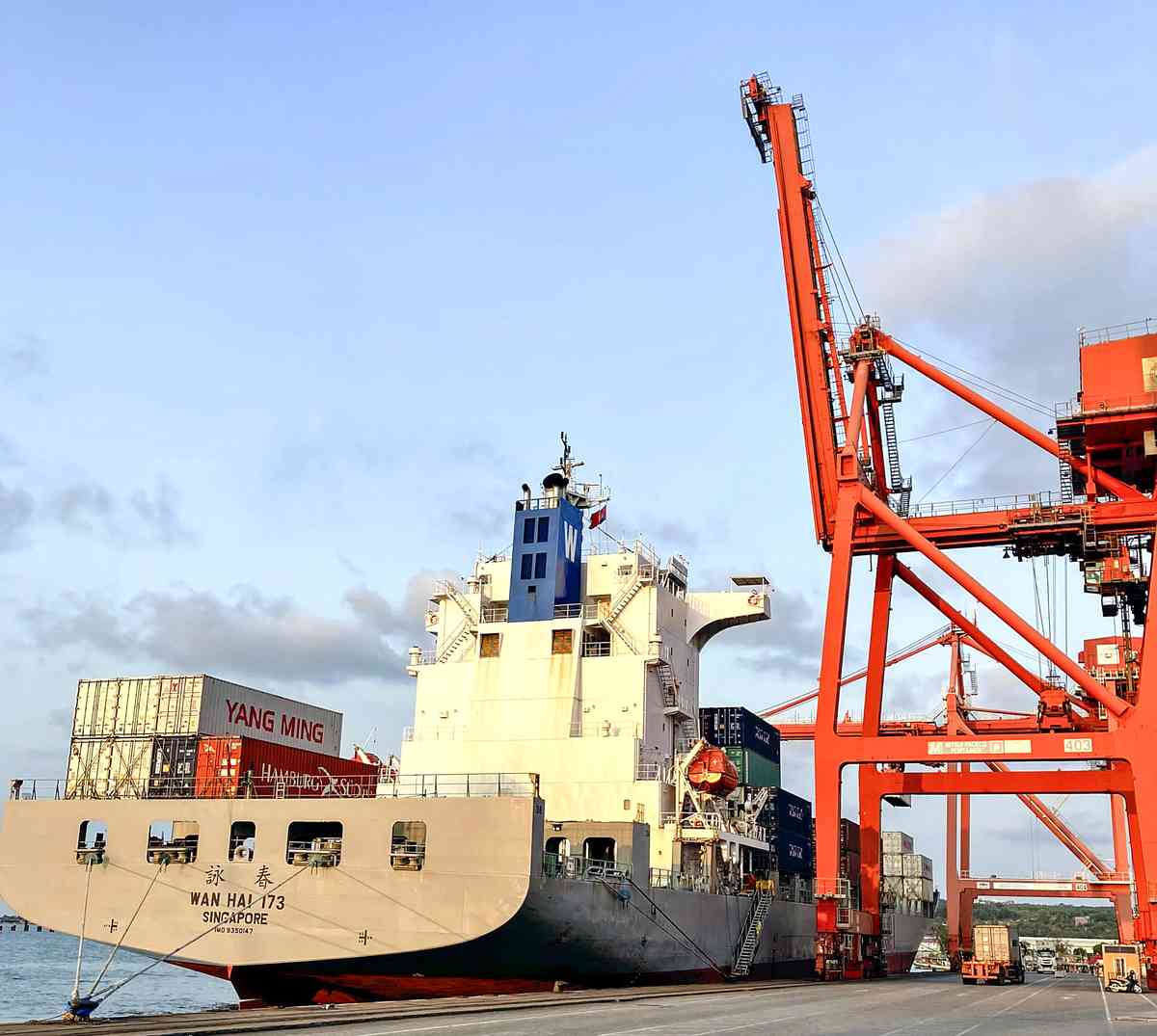U.S. Tariffs to Deal Serious Blow to Asia’s Emerging Economies; Firms with Production Bases in Southeast Asia May Be Forced to Restructure

A container ship is moored at the Sihanoukville Port in southern Cambodia in March.
16:51 JST, April 6, 2025
BANGKOK — The U.S. President Donald Trump administration’s plan to impose steep reciprocal tariffs on emerging economies in Asia is expected to deal a serious blow to their economies as U.S.-bound exports make up a considerable proportion of their total exports.
The governments of these countries plan to ask the U.S. administration to reduce the tariffs, but it remains unknown how the U.S. will respond. Under such circumstances, companies that have production bases in these countries may be forced to restructure their business.
Production centers of apparel, machinery
In the reciprocal tariffs announced last week, attention was drawn to the high tariffs to be imposed on emerging economies, such as Southeast Asian nations and India. Cambodia’s tariff rate was increased to 49% and Vietnam was increased to 46%.
As labor costs in these countries are lower than in Japan, the United States and European countries, they serve as major production centers for apparel and sports goods manufacturers. Many of the clothing and other goods produced in these countries are exported to the United States and other markets. Major U.S. firms, such as Nike, Inc. and Gap Inc., and Japanese firms, such as Uniqlo parent company Fast Retailing Co., have been expanding their production bases in these countries.
Also, Japanese electronics and machinery manufacturers have set up production bases in Southeast Asian nations and India. Machine parts manufacturer MinebeaMitsumi Inc. has plants in Cambodia, Vietnam, Thailand and India, among other countries, and exports its products from Asia to the United States. The company said it is currently examining the possible impacts of the tariffs on its business.
Chinese firms are increasingly moving their production centers for electronics parts and other products from China to Southeast Asian countries so the firms can export their goods to the U.S. from Southeast Asia in response to the U.S. government’s tightened restrictions on Chinese imports.
Responses of affected countries
Exports from Asia’s emerging countries to the United States have been increasing following the entry of Japanese, European and Chinese companies in the region. Trump, who regards the United States’ massive trade deficits as a problem, may have taken the situation to be the “looting” of wealth from the United States.
Declines of exports to the United States would immediately lead to economic slowdown. Therefore, the governments of the countries that will be affected are expediting efforts to respond.
The Vietnamese government has proposed that the United States temporarily postpone the imposition of reciprocal tariffs on Vietnam for one to three months. The United States is Vietnam’s largest export destination, accounting for about 30% of Vietnam’s total exports of $405.5 billion in 2024.
Vietnam’s top leader and the Communist Party’s General Secretary To Lam reportedly said in telephone talks with Trump that Vietnam is ready to negotiate to cut their tariffs on U.S. products to zero.
The U.S. is also the biggest trade partner of Thailand. Prime Minister Paetongtarn Shinawatra said in a statement Thursday that Thai exporters should seek new potential markets to reduce dependency on a single market and advised them to diversify their export destinations.
India has already started negotiations with the United States. The delegation of the Office of the U.S. Trade Representative (USTR) visited India in late March and discussed a bilateral trade agreement. On Thursday, India’s Ministry of Commerce and Industry said that India expects to take the negotiations forward “in the coming days.” India is believed to aim to have its tariff reduced in exchange for lowering its tariffs on goods imported from the United States.
Related Tags
Top Articles in Business
-

Prudential Life Insurance Plans to Fully Compensate for Damages Caused by Fraudulent Actions Without Waiting for Third-Party Committee Review
-

Narita Airport, Startup in Japan Demonstrate Machine to Compress Clothes for Tourists to Prevent People from Abandoning Suitcases
-

JR Tokai, Shizuoka Pref. Agree on Water Resources for Maglev Train Construction
-

Toyota Motor Group Firm to Sell Clean Energy Greenhouses for Strawberries
-

KDDI Opens AI Data Center at Former Sharp Plant in Osaka Prefecture; Facility Will Provide Google’s Gemini AI Model for Domestic Users
JN ACCESS RANKING
-

Japan PM Takaichi’s Cabinet Resigns en Masse
-

Japan Institute to Use Domestic Commercial Optical Lattice Clock to Set Japan Standard Time
-

Israeli Ambassador to Japan Speaks about Japan’s Role in the Reconstruction of Gaza
-

Man Infected with Measles Reportedly Dined at Restaurant in Tokyo Station
-

Man Infected with Measles May Have Come in Contact with Many People in Tokyo, Went to Store, Restaurant Around When Symptoms Emerged




















